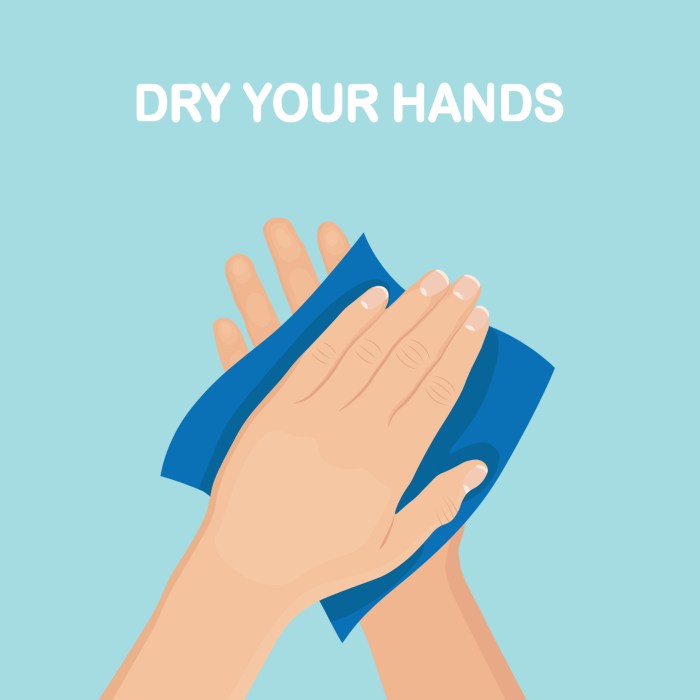Don’t wipe your hands on your apron – Ensuring food safety in the kitchen is paramount, and one crucial aspect is maintaining proper hand hygiene. This article delves into the importance of avoiding the practice of wiping hands on aprons, exploring the potential health risks and cross-contamination concerns associated with it.
Aprons serve as a protective barrier, but they can also harbor bacteria if not properly cleaned and maintained. Wiping hands on aprons can transfer microorganisms from hands to the apron and vice versa, creating a breeding ground for pathogens.
Food Safety Concerns
Wiping hands on an apron can pose significant food safety risks. The apron, often used as a protective garment, can become a breeding ground for bacteria and other microorganisms. When hands are wiped on the apron, these contaminants can be transferred to food, utensils, or other surfaces, leading to cross-contamination.
Maintaining proper hand hygiene is paramount in food handling environments. Failure to do so can result in the spread of foodborne pathogens, such as Salmonella, E. coli, and Listeria. These pathogens can cause a range of illnesses, from mild gastrointestinal distress to severe and potentially life-threatening infections.
Examples of Cross-Contamination, Don’t wipe your hands on your apron
- A food handler wipes their hands on their apron after handling raw meat, then proceeds to handle ready-to-eat salads, contaminating them with bacteria from the meat.
- An employee uses the same apron for multiple shifts without changing it, allowing bacteria to accumulate and potentially contaminate food handled throughout the day.
Apron Maintenance and Hygiene

To prevent the spread of bacteria through aprons, proper maintenance and hygiene are crucial.
- Cleaning and Sanitizing:Aprons should be cleaned and sanitized regularly, following manufacturer’s instructions. This may involve laundering, steam cleaning, or using disinfectant wipes.
- Frequent Changes:Aprons should be changed frequently, especially if they become visibly soiled or after handling raw meat or other potentially hazardous foods.
- Proper Storage:When not in use, aprons should be stored in a clean, dry place to prevent contamination.
Alternative Hand Wiping Methods

Instead of wiping hands on aprons, there are several acceptable hand wiping methods in food handling settings:
- Disposable Towels:Single-use disposable towels are a hygienic option, as they can be discarded after each use, preventing cross-contamination.
- Hand Sanitizers:Alcohol-based hand sanitizers can be used to kill bacteria on hands, but they should not be used as a substitute for proper handwashing.
- Designated Hand-Washing Stations:Hand-washing stations with soap and running water are the most effective way to remove bacteria and contaminants from hands.
Proper hand drying techniques are also important to prevent cross-contamination. Use clean, disposable towels or air dryers to thoroughly dry hands after washing or sanitizing.
Staff Training and Compliance
Training staff on proper hand hygiene and apron use is essential for maintaining food safety.
- Training:Staff should be trained on the importance of hand hygiene, the risks associated with improper apron use, and the proper procedures for cleaning and changing aprons.
- Monitoring and Enforcement:Managers should monitor staff compliance with hand wiping policies and take corrective action when necessary.
- Culture of Food Safety:Create a culture of food safety awareness among staff by emphasizing the importance of proper hand hygiene and apron use in preventing foodborne illnesses.
Regulatory Compliance and Inspections: Don’t Wipe Your Hands On Your Apron

Non-compliance with hand wiping regulations can result in penalties and fines.
- Regulatory Inspections:Health inspectors routinely inspect food handling establishments to ensure compliance with hand wiping regulations.
- Preparation for Inspections:Establishments should prepare for inspections by ensuring staff are trained, aprons are clean and sanitized, and alternative hand wiping methods are available.
FAQ
Why is it important to avoid wiping hands on aprons?
Aprons can harbor bacteria, and wiping hands on them can transfer microorganisms from hands to the apron and vice versa, increasing the risk of cross-contamination.
What are the recommended methods for cleaning and sanitizing aprons?
Aprons should be washed in hot water with detergent and sanitized regularly using a bleach solution or commercial sanitizer.
What are the advantages of using disposable towels for hand wiping?
Disposable towels are single-use, eliminating the risk of cross-contamination from reusing towels.
